
The government has approved a £1million package of new research projects aimed at finding biological crop protection solutions for growers.
Researchers in one project will target the apple leaf midge which attacks top fruit orchards and nurseries by designing traps containing female midge pheromones to lure male midges. The aim is to give growers an early warning of an impending invasion and so they can take measures to protect their apples.
Other projects include a study to combat clubroot, a disease which causes some £30 million of damage to crops such as turnips and Brussels sprouts every year.
Lettuce, cabbage, leeks, blackcurrants and herbs are among the other crops which scientists hope to protect using the biological defence mechanisms. Food and farming minister Lord Whitty said:
"Reducing reliance on pesticides is a priority, and we want to find alternative, more environment-friendly pest controls for farmers and growers.
"Science is important to improving the performance of our horticulture and the results of this new research should give them a competitive advantage and save valuable crops."
All the research is backed by money from the Department for Environment, Food and Rural Affairs (Defra), with some financial support from industry. Defra spends almost £13million a year on research into alternative pesticide and plant protection.
Defra has chosen six projects from a range of bids which will be carried out by SAC, Adas, HRI, the Natural Resources Institute, Saynor Consultancy Services, Bioss and Rothamsted Research.



